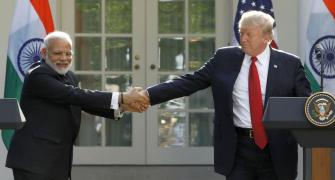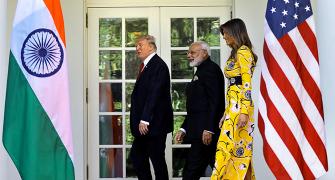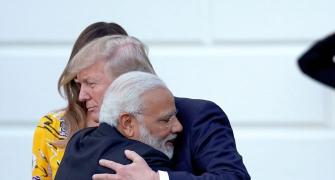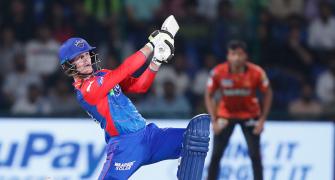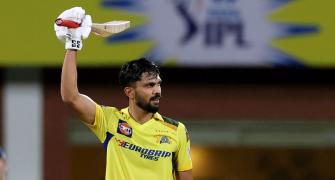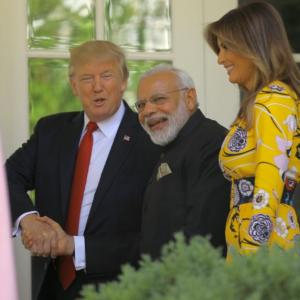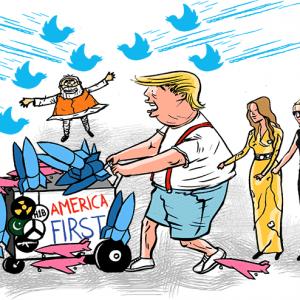Naresh Chandra -- distinguished civil servant and diplomat -- passed into the ages on Sunday, July 9.
Ambassador T P Sreenivasan salutes a patriot like none other.
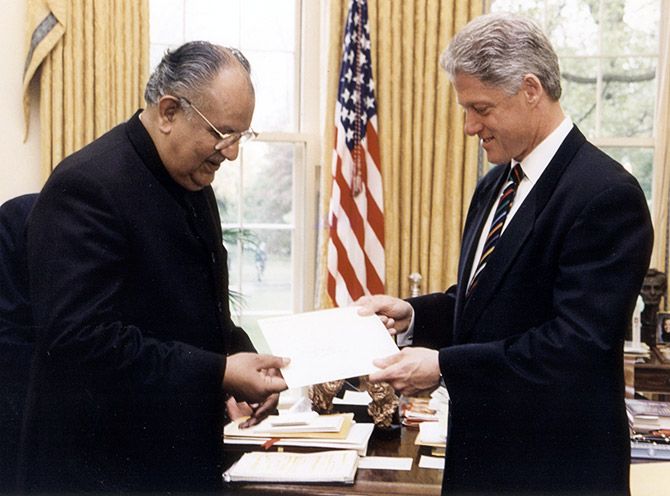
What Cassius said about Julius Caesar, 'Why man, he doth bestride the narrow world like a Colossus' is true of Ambassador Naresh Chandra, who passed away on July 9, 2017, literally and figuratively.
He carried his heavy frame lightly, but made a great impression in any company by the weight of his words and the quality of his humour.
He was unperturbed in the midst of any typhoon like its centre and found solutions on the spot.
He was gracious and kind always, but ruthless in dispensing justice and enforcing discipline.
Erudition, integrity, efficiency and loyalty set him apart from the humdrum bureaucracy.
There is no man on earth, who had the kind of positions he held.
Chief Secretary, Rajasthan, Defence Secretary, Home Secretary, Cabinet Secretary, Adviser to PM, Governor of Gujarat, Ambassador to the US, Chairman of the National Security Advisory Board -- that was a career that dreams are made on.
By the time I met him as my boss in Washington, he was a veritable treasure house of wisdom, experience and fund of stories and an extraordinary capacity for spin, which made him a blessing for friends and a nightmare for adversaries.
I was sent to Washington as Deputy Chief of Mission in 1997 after a brilliant colleague had to move out of Washington mid term partly because of Chandra's wish to see her go.
I was, therefore, apprehensive on many counts, but he did not give me even a hint of any problem he had.
He had apparently rejected many names, but accepted me on the recommendation of the then prime minister I K Gujral, who was once my boss in Moscow.
I had heard many stories about the tussle between the ambassador and his deputy in Washington, particularly because of the notional ambassadorial status of the deputy, who is designated as Head of Mission for administrative matters.
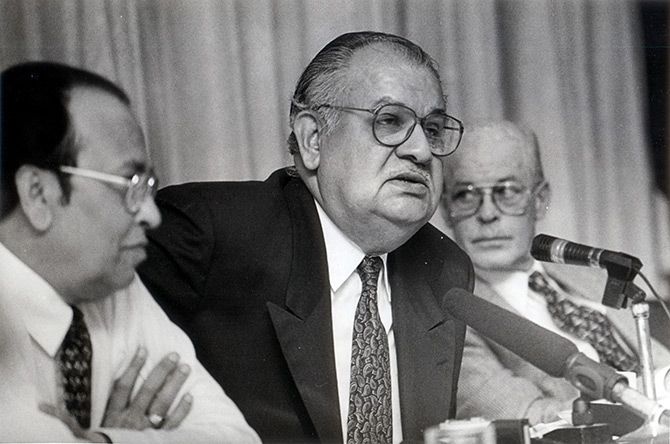
But I had a very smooth relationship with him throughout even when we had differences of opinion.
His style was to pick up a couple of important matters to deal with and leave the rest to me.
He spent the rest of his time, chatting with people or working on crossword puzzles, which was a lifetime passion for him.
Even when he appeared unconcerned about things around him, he was in control, because of his administrative acumen.
He avoided confrontation with anyone, but he had his way of conveying his feelings in Machiavellian style.
He was quick to detect deceit and disloyalty, to which he had zero tolerance.
One or two officers tried to take him on and ended up in dire straits.
Chandra's finest hour came, as Ambassador Nirupama Rao noted in her condolence tweet, when the Indian nuclear tests came as a bolt from the blue over Washington.
The way he swung into action in a hostile situation and used all methods to rescue the situation was amazing.
To quote from my book, Words, Words, Words, "The embassy geared up for the exceptional situation faced by us. Our lobbyist David Springer pointed to the great damage the tests would cause to India-US relations that he had helped to build and suggested that we should lie low for a while.'
'Chandra rejected the advice outright and asked me to draw up a programme of aggressive salesmanship of our new nuclear policy.'
'It was decided that the State Department, Congress, the media and the Indian community should be contacted at every level and that no stone should be left unturned to carry the message of the rationale of a minimum deterrent home to everyone.'
'Chandra himself met the main players and I accompanied him to most of the meetings.'
'My other colleagues and I fanned out on our own to meet the others.'
'Chandra's media management was impeccable. He was on every television channel, answering questions patiently, convincingly and transparently.'
'The sheer value of his arguments appealed to the viewers. In fact, many of the points he made on live television subsequently became the talking points for Indian diplomats around the globe.'
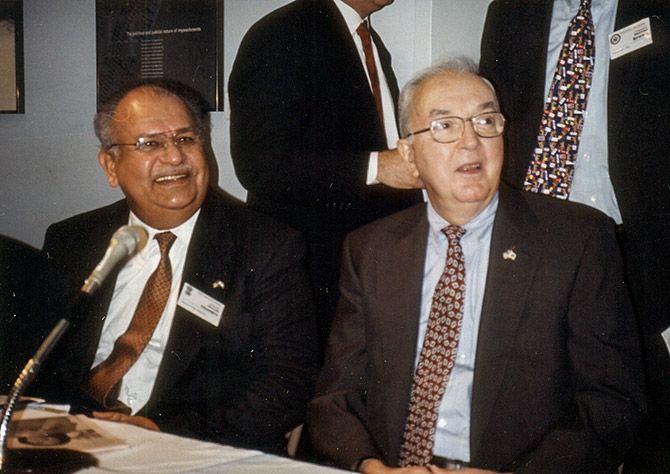
Chandra's presence in Washington during the two years of struggle from 1998 to 2000 made a big difference to India-US relations.
Every weapon in his armoury of knowledge about our nuclear policy was used to counter and cajole the Americans.
His mastery of the art of spin brought diplomats, Congressmen and Senators and the media under his spell.
He had good relations with senior politicians like Henry Kissinger who sought his advice on various matters.
He nursed the India Caucus in the US Congress with care.
Then external affairs Minister Jaswant Singh kept him by his side at every round of conversation with then deputy secretary of state Strobe Talbott.
The Gandhi statue on Massachusetts Avenue on federal land outside our embassy in Washington can well be a monument to Chandra.
Such was the dedication with which he took up the fifty-year-old proposal and executed it.
He inspired all of us to work at different levels to make his dream come true.
To quote from my book again, 'Naresh Chandra set his heart on completing this project and he took the lead himself in accomplishing it...'
'The bureaucratic hassles of putting up a statue on federal land, even with a Congressional decision to back it, were mind boggling...'
'Short of changing the way Gandhi looked, the various Committees interfered with everything -- its height (should not be higher than the Churchill statue a mile down the same street), the size and shape of the pedestal and the landscape around it.'
Chandra personally appeared before these committees and got the necessary clearances.
As it happened, one of the committees met on the day after our nuclear tests and we were sure that the Gandhi statue would be one of the casualties of the tests.
But Chandra's interest and zest saw us through, with the observation that the statue would remind the Indians of the ideals of Gandhi from which they were moving away with actions like the nuclear tests.
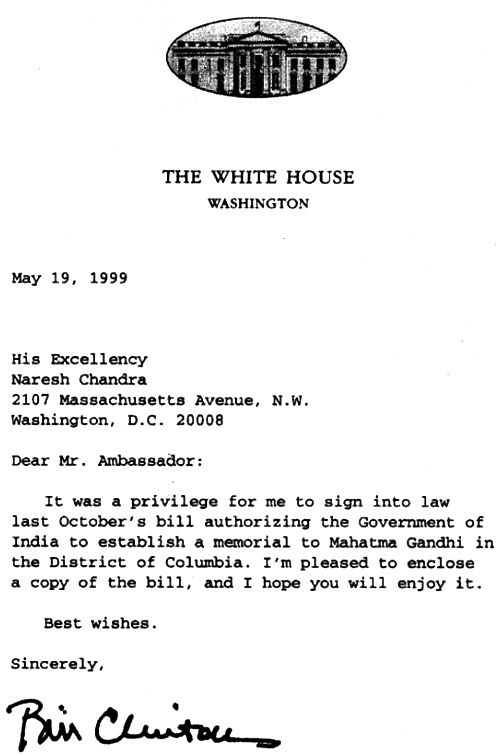
His relations with the Indian community in the US was warm and correct, but he did not go overboard with them like some of his predecessors did.
He left the community work to the minister concerned and myself and he was highly selective in his contacts as he had no patience with community politics and their personal ambitions.
At the same time, his doors were open for the Indian community for serious work.
I was very moved when Chandra offered his official residence to conduct the wedding of my son Sreenath to Roopa Unnikrishnan, a shooting star with a Commonwealth gold medal.
He had known Roopa as a young girl in Colombo where her dad was working when Chandra was posted there. We virtually occupied the house for two days. Chandra and his niece Vatsala took care of our every little need for the wedding.
We remained in touch with each other even after we both left Washington and we were together again in the National Security Advisory Board.
With his forceful personality and mastery of government, he acquired the position of an adviser to the prime minister.
He was later a much sought after adviser for some major private firms and it was reported that he was one of the best paid consultants in the industry.
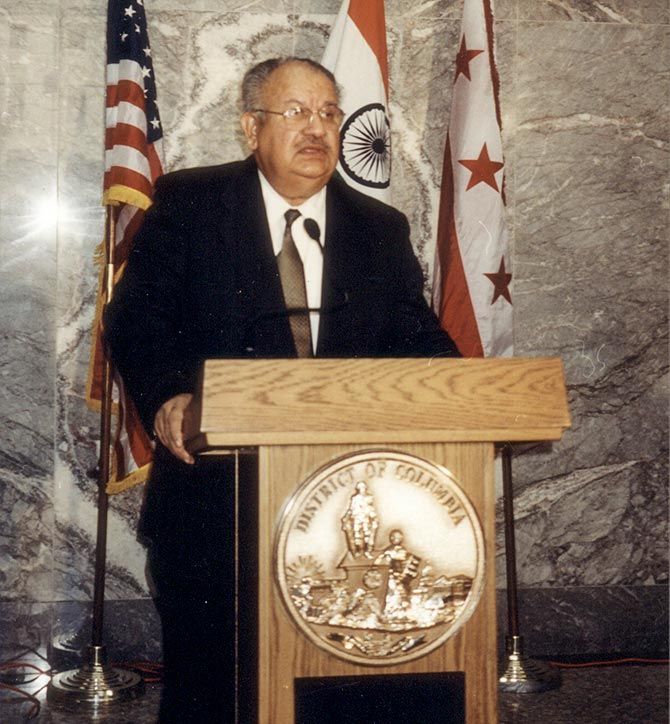
Chandra lived a full and fruitful life and left his indelible imprint on each of his assignments.
He remained a bachelor all his life and his explanation was that he was too busy to find a wife himself and he had no parents to push him into an arranged marriage.
In any event, he was too immersed in work to be a family man. But having adopted his niece and her children, he had the love and care of a family.
Chandra was a bureaucrat of bureaucrats and a diplomat of diplomats.
But he was able to transcend the limits of both professions to reach extraordinary heights.
As for myself, as I said at a warm farewell party he gave me, I learnt in the three years under him what I did not learn in the previous thirty years.
T P Sreenivasan, (IFS 1967) is a former Ambassador of India and Governor for India of the IAEA, Chairman, Academic Council and Director, NSS Academy of Civil Services, Director General, Kerala International Centre.

